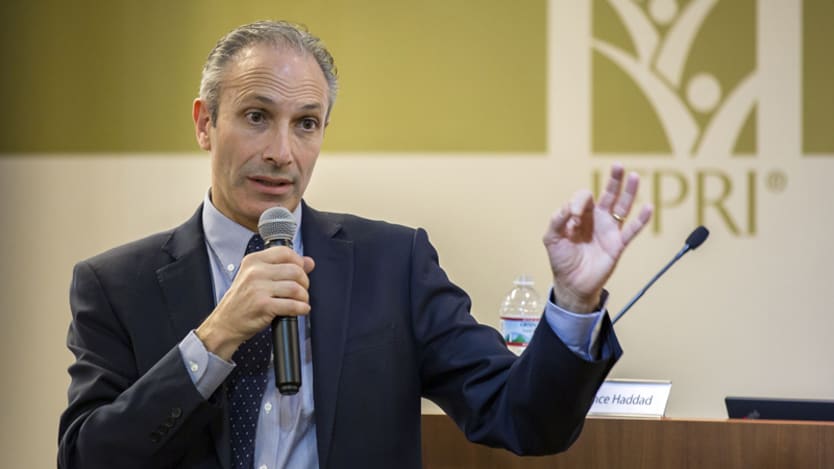
DES MOINES, Iowa — Lawrence Haddad remembers what it was like to grow up in a family struggling to get by. After emigrating from South Africa to London in 1961, he was raised by a single mother who relied on public assistance to feed her family.
Haddad, who was exposed to global humanitarian work from a young age when he volunteered with his mother in a Save the Children charity shop, credits these early lessons with shaping his future career. After studying economics and nutrition, he has worked to draw the link between food security and nutrition, and economic development.
Last week, Haddad was honored for this work with the World Food Prize. He is sharing the $250,000 award with Dr. David Nabarro, whose separate but concurrent efforts were also recognized for contributions to elevating the importance of nutrition in global development.
Nutrition gets a moment at the World Food Prize as global hunger rises
As global hunger is on the rise, Lawrence Haddad and Dr. David Nabarro won the 2018 World Food Prize for their work in elevating the importance of nutrition within the first 1,000 days of life.
“David and I like to connect the dots,” Haddad said of their work in moving nutrition from an issue only discussed in the health sector to one that is also integral to other sectors such as agriculture, education, and the environment.
Haddad, who is now executive director at the Global Alliance for Improved Nutrition, said he plans to use his platform as a laureate to promote the global nutrition agenda by using it to access presidents and boardrooms. He recently sat down with Devex at the Borlaug Dialogue at the World Food Prize to talk about how that effort is key to helping people understand why nutrition should be considered a diplomacy and defense issue.
This conversation has been edited for length and clarity.
How do you convince people we have the power to solve malnutrition, even in tough environments where there is conflict?
Nutrition is on a journey. We’ve moved it from the health sphere into the development sphere. But we now need to move it into the diplomacy and defense spheres. But those “three Ds” need to come together for conflict prevention and peace promotion — to begin to build the evidence arguments. We know that food price spikes devastate children's lives, are linked in a very direct causal way to the propensity of conflict.
What impact does nutrition have on children in conflict?
We know that kids that are better nourished have a more balanced profile of emotions — they’re better able to control emotions, they’re less impulsive, they’re more likely to collaborate. These are all things that are very important — to work with the diplomacy guys and defense guys and we’re not doing that at the moment.
I always say conflict is like a reverse time machine, taking us back. The numbers that we have for hunger are the same numbers that we had 10 years ago. It’s like back to the future.
What is the best way to get governments to take action to improve nutrition?
Peru is one of the star pupils when it comes to nutrition. The story behind Peru is an interesting one. About 12 years ago, there was an election and all the Peruvian and international NGOs banded together and they said: “We’re going to get a commitment from each of the candidates running for presidents that if they were elected, they will allocate this many resources to nutrition, endeavor to reduce stunting by this much by this date,” and they all signed up to it.
And former Peruvian President Alan García held to it. So social movements and civil society organizing, educating, and agitating made the government pay attention. Most governments want to do the right thing but there are a lot of people clamoring for their attention. The nutrition people need to learn how to clamor a bit better and more effectively.
How is nutrition connected to climate change?
“The crazy thing is people in nutrition have a lot to offer people in climate because it’s the choices we make about what we grow and what we eat that has a huge impact on greenhouse gas emissions, as well as health.”
— Lawrence Haddad, executive director, GAINNutrition people need to connect to climate change people. I went to the COP in Paris a couple years ago. There were 10 nutritionists in the whole thing, amid thousands of people working on climate issues. You’re not going to get heard.
The crazy thing is people in nutrition have a lot to offer people in climate because it’s the choices we make about what we grow and what we eat that has a huge impact on greenhouse gas emissions, as well as health. Climate people need us actually, they just don’t know it. And the nutrition people need the climate people, and they just don’t know it. We need to connect the dots.








